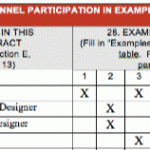Some people think proposal competitions are all the same. We compete and whomever had the best relationship wins.
These people are wrong. This is because the type of procurement has a dramatic effect on the proposal competition. Let’s look at a few procurement types and discuss what effect they have.
Low Bid
Low bid or “lowest qualified bid” comes down to price. If your price is 30% higher than the low bidder, it won’t matter that you know the client’s kids names or that they invite you to Thanksgiving dinner every year.
Qualifications Based
Thank the Brooks Act for your job!
These procurements don’t take price into consideration. Qualifications-based procurements are ripe for misconduct because the value of a team’s qualification is up to interpretation. It can’t be easily quantified. So, you have no idea whether the procurement is wired or on the up and up.
Even if you think you “pre sold” the job, you’re probably not the only firm that’s done so.
Best Value
The Brooks Act only requires that the government doesn’t select professional service providers based solely on price. But again, because the value of qualifications is left to interpretation, the way a client scores can easily turn this into a low-bid situation.
It could also go the way of a qualifications-based competition, especially if the budget is known or prices come in relatively close. Obviously, in this case it is subject to the same possible outcomes.
It could also turn into a truly value-based competition where both price and qualification play a role.
Prequalified List, IDIQ, and Supply Schedule
This is, in my experience, the most common type of procurement in the private sector. In these situations you have already proved your qualifications are “good enough,” so you can be successful a few different ways.
- Being the most qualified
- Having the job wired in your favor
- Having the lowest price
- Being deemed the best value
You can also win by being the next in line. If clients only ever hire one firm, they know other firms will eventually wise up and stop submitting proposals. This reduces their options and creates a perception of decisions that are not in the best financial interests of their employer. Therefore, it’s in the best interest for clients to “spread the wealth.”
Sole Source
This is the only type of procurement that you can argue is based entirely on “relationship.”
Here you have either convinced the client there is only one suitable provider or he/she just doesn’t want to go through the hassle of a competitive procurement.
Broad generalizations, like “it’s all about ___,” are simply a way for people to deflect blame when they lose or inappropriately give themselves more credit for a win than they deserve.
Key Takeaway: The type of procurement plays a huge factor in how much you can rely on that great relationship you have with the client.
If you liked this article, please subscribe below. If you want to give us your thoughts on this issue, please leave a comment below.






Speak Your Mind